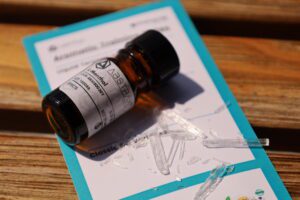NO! The end.
Ok, as much as I’d love to wrap up this myth with a simple no, there is so much placebo happening with it that it deserves a logical breakdown. Mangos do not get you higher, and if you think they do, it’s not because of anything in the mango; it’s all in your head.

What exactly is the mango claim?
Rumor has it, if you eat a mango before you smoke or eat an edible, you will feel a lot higher for longer because mangos contain a lot of myrcene. And myrcene opens up the BBB (blood-brain barrier), allowing more THC to enter the brain, making you get higher for longer.

Before we dive into busting the mango myth, ask yourself a couple of questions.
What variety of mango should be eaten? How ripe should the mango be? How many mangos do you need to eat based on your size and weight? How long do you need to wait to smoke after eating the mango?
Don’t you think if the mango claim were real, that someone would have a bit more instruction than “eat some mango, mannnn?”
Why is the mango claim bogus?
- Based on the most common mango varieties, they contain minimal to no myrcene. Instead, terpenes like carene, limonene, terpinolene, and others make it to the top of the list. There are plenty of other food products that have more myrcene than mango, so why did someone single out a product that hardly contains any myrcene in the first place?
- Myrcene does not increase THC potency at CB1 receptors (the ones that make you feel high).
- THC is lipophylic or fat-loving, meaning that it doesn’t have any problems crossing the BBB on its own. THC doesn’t need help from myrcene!
- When you eat terpenes or foods containing them, your stomach destroys or converts them into different derivatives. And just like the liver metabolizes cannabinoids and other drugs, the same thing happens with terpenes. Some of a terpene’s various metabolized forms will consist of derivatives that cannot attach to cells to have a physiological effect, while others can.
- The dose of a terpene is what determines its efficacy. There is a reason you need to take 400-600 mg of Ibuprophen, but only need to take 2.5-5 mg of THC for it to be effective. Every drug or therapeutic compound has its unique potency. The same applies to terpenes, but right now, there are hardly any clinical trials on the therapeutic value of ingested terpenes to know what terpene at what dose would be effective for a, b, or c. Although some studies on mice or cells indicate that terpenes (not myrcene) may enhance cannabinoid activity, the doses are generally very high. Also, keep in mind that humans aren’t mice, so these studies need to be taken with a grain of salt. Mice research is an excellent step towards human research, but unfortunately, it doesn’t always pan out the same way.
- The Placebo Effect is one of the most potent drugs, and it’s getting stronger! The very idea of thinking that mangos will get you higher is enough for it to happen. The problem is, it had nothing to do with the mango. Mangos could be replaced with ribeye steaks, dandelions, hay, or Swedish Fish, and if there is enough belief that the claim is valid, then it will happen! If sugar pills outperform countless pharmaceutical drugs, your friend promising that you’ll get higher from their mango jello could be just as effective.

What’s my beef with mangos? Honestly, I don’t care if you eat mangos and feel higher; I think it’s pretty cool that the mind is so powerful. But what I do care about is how gullible people are and how quickly they will “share” something without questioning it or doing any research first.
When discussing misinformation in the cannabis space, something as simple as an enhanced mango high may seem trivial. Still, in the long-term scope of combating misinformation about weed, facts are our best friend! I would encourage you to have a mildly skeptical perspective on anything new you hear about cannabis. It doesn’t mean that you should think everything is a lie or blown out of proportion, but it does mean that you should question everything! Ask for references, do some research, validate the data, and identify if the research is even relevant to humans!
Now, time for some fun. Please experiment with a friend or family member to prove my point that mangos could be replaced with anything. Go to the grocery store and buy any fresh ingredients. Cook dinner for someone you know well and tell them that the featured ingredient will make them feel super high after they smoke. If they ask why they will get higher, tell them the terpenes in the dressing you made will make the higher, or the omegas in the salmon will make their CB receptors more active, or the high flavonoid content in their smoothie works in entourage with THC. Have fun here, but be sure to sound convincing. If you’re not sure what to say, then tell them that you heard about it from a group of people at a party, you tried it, and got super high.

Enjoy your meal, and then tell them you have to wait about 30-45 minutes before you smoke so that the ingredient can be digested and start working its magic. Then pack a bowl and smoke the same weed you usually would with them. Don’t say anything like, “how do you feel .” Don’t try and influence them by saying, “oh wow, I feel so much higher .” Let them do the talking and see if they are the one that ends up telling you that they are extra baked because of _________ ingredient!

It may take a couple of people for this experiment to finally work because some people aren’t susceptible to the placebo effect based on their genetics. BUT I promise you, it’ll eventually happen, and you’re going to be blown away at how incredible the power of suggestion and placebo are!
Remember, what you believe is what you’ll perceive.
Cheers,
Chef Brandon Allen
Oh, one more thing. The new Cooking with Cannabis course is now available. Be sure to check it out if you want to learn new ways to totally up your pot brownie game!



